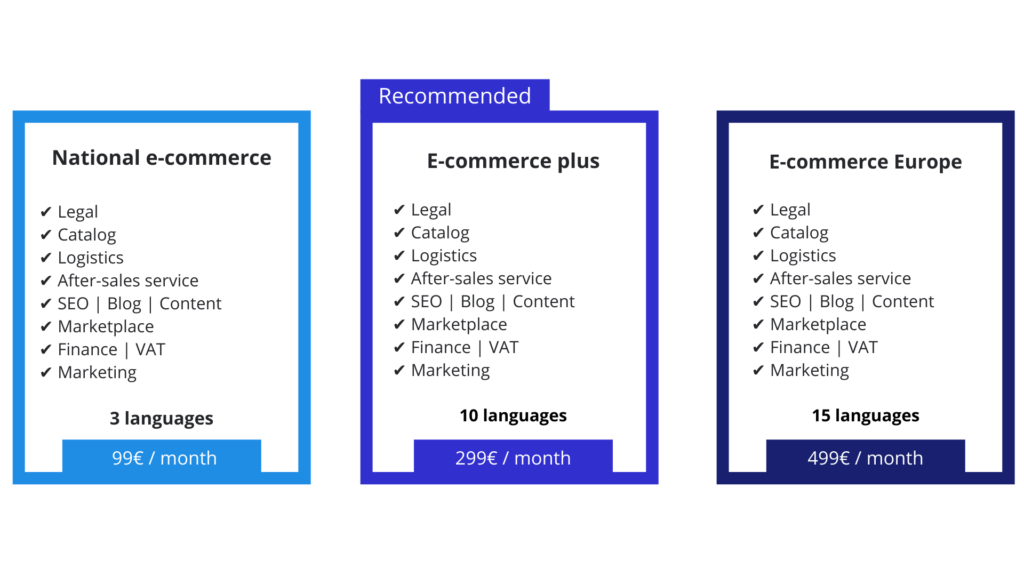
E-commerce delegation: what future can be expected?
Still relatively little practiced by brands in Europe, the delegation of its e-commerce activity to a specialized service provider is nevertheless a solution widely adopted internationally.
What are the strategies of the main companies handling the online sales activity of brands? What are the challenges of the sector and the keys to success? Here is our analysis.
Financial issues
The difficulty of making money in e-commerce is now a commonly held opinion. It is therefore logical that the e-commerce delegation, which adds an intermediary between the brand and the consumer, needs to be carried out to the letter, otherwise it will be forever out of balance. The brand must absolutely have a good retail reputation for its e-commerce site to have a chance of achieving a real turnover. This is something we have observed after years as a major player in e-commerce delegation in Luxembourg and Europe. The brand must also have a real digital strategy so that e-commerce does not become the fifth wheel.
Furthermore, to be profitable, an e-commerce delegation activity must be able to rely on a sufficient average shopping basket. The average amount of orders must be over 50 euros in order to amortize a certain number of fixed costs. At Powerlab, for example, the management costs of a branded merchant site. Which are mainly human resources costs, can be broken down as follows: marketing costs (daily management of the site, CRM, traffic, Magento back-office, etc.); technological costs (catalog, photos, changes to be made to the site, etc., and therefore developers); graphic costs (banners, animations, newsletters, homepages, etc.), a dedicated e-store manager and finally logistical costs (warehousing, picking, dispatch).
Assessing the potential of the brand
As a result, not all brands are interesting for a delegator. The delegator must therefore assess the brand’s potential and his own costs extremely well before accepting a new brand. It also means that some brand segments are simply not interesting. Those with an average shopping basket of fewer than 50 euros. Leather goods or lingerie may well be suitable but beware of entry-level cosmetics, for example.
Between the incompressible costs: logistics and delivery. But also the cost price of the product, the percentage of the delegator, and the marketing costs, there would be nothing left. But it is absolutely necessary to be balanced.
Deciding on a remuneration scheme
The next step is to decide on a method of remuneration. Most agencies take a commission on sales. At Powerlab we work with a one-off initial contribution, a choice of 3 monthly subscriptions, and a 15% commission on sales. Your subscription is personalized, you have control over everything and there are no hidden costs.
We take care of everything, the product catalog, logistics, after-sales service, referencing, content, your positioning on marketplaces, and also marketing.

The comings and goings of brands
Running a profitable e-commerce delegation business is not easy. And above all, brands that acquire Web skills may eventually want to manage their online sales. Especially since it is in their interest to multiply cross-channel gateways. Others, after having (re)internalized their e-commerce activity, nevertheless re-launch a call for tenders. Is this a failure, or is it a very common pendulum swing?
A delegation solution may seem expensive after a few years. When new management or IT department arrives, the client may think that it can be handled by itself. But most of the time, they come back. The way history works are to leave the management of the business to those who know it best. Our business is very technical, the business of brands is to focus on creation and sales. A brand cannot integrate all the changes in our industry as quickly as they happen.
Finally, the choice to delegate or to internalize is not necessarily linked to the maturity of the brand. This is because the majority will probably never really be ready. Only those that have made e-commerce a strategic priority, such as Burberry or Yves Rocher, manage to obtain a significant online turnover. For the others, these revenues remain between 1% and 5% of that of the company, with e-commerce, therefore, representing more of a sub-objective. This decision is based on other factors, starting with the desire to have successful e-commerce. Although today, after the Covid 19 crisis, these figures are tending to increase, as brands finally understand the importance of e-commerce.
Towards cross-channel and CRM?
The result is that brands would rather ask to extend contracts, or even change the delegator, but without internalizing the e-commerce activity. And brands that wish to make a particular segment strategic – logistics, social networks, e-marketing, etc. – will internalize that segment. At Powerlab, we are therefore anything but worried about the future of the e-commerce delegation. Rather, we see the activity increasing strongly, with much more ambitious partnerships including cross-channel and CRM, and more specialized segments.
We can see that many sectors, particularly the hardware and software sectors, are experiencing a swing between resellers and manufacturers. That is periodically taking over the distribution of their products. It’s a question of people and trends. This back-and-forth also exists in the delegation, but there is no fundamental movement towards internalization.
Indeed that brands have always worked with distributors, commercial relays in certain countries. Or even travel retail for the top of the range. Similarly, in e-commerce, because technology is evolving, we are more easily challenged daily on business metrics than the brands. In a word: e-commerce skills and infrastructures require significant investments that it is better to pool. And it is in the brands’ best interest to focus on their know-how: building their offer… and selling.
Conclusion
There is no doubt that the delegation sector is still in the process of being structured. Its players are adopting very different positions to address brands with equally diverse needs. And each is looking for the best direction, the best evolution to accompany a portion of these brands. We can therefore expect a fairly limited number of players to share a market of 200 to 300 brands over the next few years. A market segmented in terms of the height of range, type of products, and nature of the distribution network.
While this analysis mainly covers e-commerce outsourcing services targeting brands, retailers are also sometimes looking for service providers capable of handling their online sales. As these retailers are often not the core target of outsourcing agencies. Other types of service providers are emerging to meet these new needs. Starting with some e-tailers themselves, who choose to make their know-how available to retailers.
To continue reading the subject about e-commerce delegation, we suggest you these articles :
- Advantages and disadvantages of e-commerce delegation;
- 5 reasons to delegate the management of your e-commerce website.
- The 5 benefits of e-commerce delegation
You can find all the articles about e-commerce delegation in this category.
Do not hesitate to contact us if you want more information. Or you can also leave a comment.
Hi there I am so thrilled I found your website, I really found you by accident, while I was looking on Digg for something else, Anyhow I am here now and would just like to say thank you for a tremendous post and a all round thrilling blog (I also love the theme/design), I don’t have time to read it all at the moment but I have book-marked it and also added your RSS feeds, so when I have time I will be back to read much more, Please do keep up the excellent work.
Hello Adrianne! Thank you for the nice comment, we appreciate it. We hope to see you soon on our blog! Have a great day.
Howdy! I could have sworn I’ve been to this site before but after reading through some of the post I realized it’s new to me. Anyways, I’m definitely glad I found it and I’ll be book-marking and checking back often!
Thank you Dotty, for the nice comment, we really appreciate it. As for the posts, we publish once a week. Have a great day
Somebody essentially helps to make serious articles I would state. This is the very first time I frequented your website page and thus far. I am amazed by the research you made to make this particular publish amazing. Magnificent job!
Thank you Meyer for the nice comment. Do not hessite to bookmark our blog to not miss any information. Have a great day!
There is evidently a bundle to identify about this. I believe you made some nice points in features also.
Thank you Lionel for the nice comment. Have a great day!
I am often to blogging and i really admire your content. The article has actually peaks my interest. I am going to bookmark your website and preserve checking for brand-spanking new information.
Thank you Janice for the nice comment, we really appreciate it. Have a great day!
I’m amazed, I have to admit. Rarely do I come across a blog that’s equally educative and engaging, and without a doubt, you have hit the nail on the head. The issue is something too few people are speaking intelligently about. I am very happy that I stumbled across this in my hunt for something regarding this.
We are glad to read that you enjoyed your read and found the information you were looking for. Do not hesitate to bookmark our blog. Have a great day!